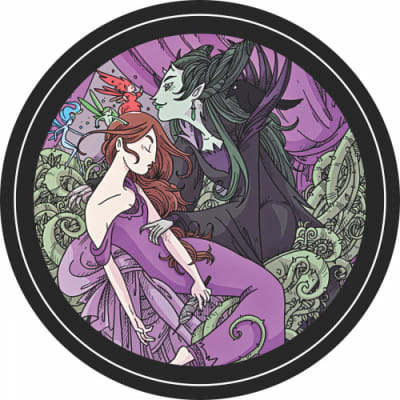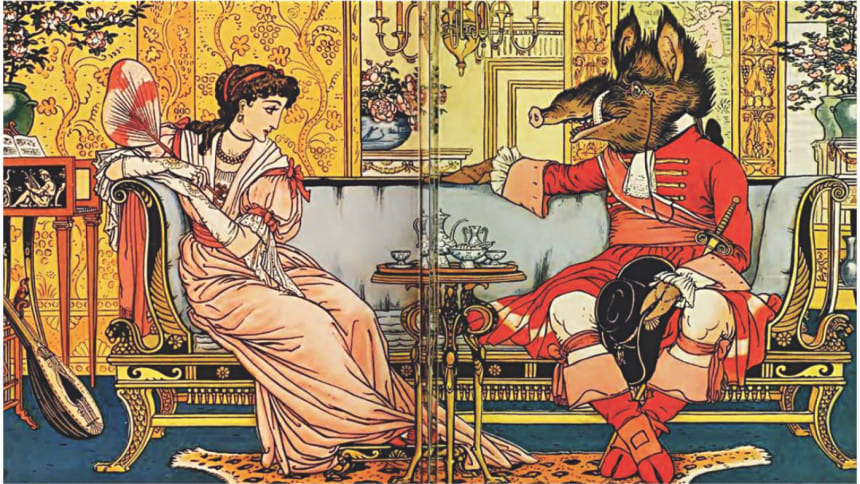Why We Need Fairy Tales

Similar to fables, fairytales have been passed down orally through generations. These tales were believed to help develop the ethics of young minds. Nowadays, people have become sceptical about some of the messages they convey to youngsters.
An article mentioned in the Telegraph talks about 2000 surveyed parents who believe fairytales to be "too scary for modern children". Among the ones no longer read to children, childhood staples like Snow White and the Seven Dwarves, Hansel and Gretel, Cinderella, Rapunzel and the Gingerbread Man seem to make the top of the list.
This begs the question, are images portrayed in fairytales so much more gruesome or inappropriate than the ones shown in modern-day cartoons and video games? More importantly, how else are children supposed to learn about the hard truths of life if not from tales that, in the words of C.S. Lewis, "Say best what needs to be said"?

Stories like Hansel & Gretel and Little Red Riding Hood bring to life one of the first lessons we're taught as children – "Don't talk to strangers." Their journeys through the woods teach us how deviating from the safe path, and disobeying parents, leads to disastrous consequences. In the case of Hansel and Gretel, we learn how even children can save themselves from harm with a little teamwork and intelligence. Both stories also portray the perils of deceptive appearances and teach us to not trust just anyone who says, "No harm shall happen to you."

As children, we had a myriad of crazy fantasies; Neverland felt like a realization of all the games we used to play and the imaginary perils we fought against. The character of Peter Pan, craving freedom from rules and forced to pay a price of eternal youth and isolation, is the ultimate lesson for unruly children. Once again, it shows us what happens when we do not want to listen to our parents. But while the story instils into us a certain fear of disobedience, it still lets us experience vicariously that dream life through Peter and his companions.
The simplest yet crucial lesson embedded in fairytales is that of hope and kindness. A popular criticism aimed at Cinderella is that it teaches young girls to be materialistic and "boy-crazy", as the modern woman needs no prince to find her happy-ever-after. But these sceptics overlook how Cinderella dreamt not of landing the prince, but of witnessing beauty, gaining freedom and having fun: dreams that were quite ahead of its time. Even today, what most Cinderella fans remember learning from the story is the strength of her hope and her generosity. As Rafidah Rahman, 22, points out, "It teaches us that good things happen to good people, no matter how strong or negative the external force."
In recent years, Beauty and the Beast has been in the same league in attracting criticism about the message it gives to children. Parents are worried about how the tale of a young girl forced to remain confined within a castle with a beastly creature might influence young girls into making wrong relationship choices in the future. Amidst of all this condemnation, the actual message of the tale loses significance.
Belle, an intelligent and knowledgeable girl, sacrifices her freedom and comfort in exchange for her father's wellbeing; a maiden chooses a pure heart over external beauty, and a young man learns through hardship to overcome vanity with love. What better way to combat all the shallowness popular culture usually promotes to youngsters than this?

As Zara Islam, 22, a fellow lover of the story points out, Beauty and The Beast is special because: "It teaches us to look beyond physical appearances, to find goodness and love in the power of repentance. Even beasts deserve happy endings if what's on the inside is selfless in its intentions."
And unlike Cinderella or the Sleeping Beauty, this particular tale attracts children of both genders. "My favourite childhood fairy tale would have to be Beauty and the Beast," says Armaan Ibrahim, 16. "It tells us that even the most cold-hearted monster can find peace."
The greatest gift of fairytales is how it nurtures our imagination and gives us an insight into different cultures around the world. Princesses and knights in shining armour are all too common, but reading the 1001 Nights and watching Disney's Aladdin unveiled to us at a young age the mystique of Middle Eastern culture. These stories, with their haunting caves and enchanted lamps, exposed us to a kind of magic different from what most children's stories describe. It's no surprise that Aladdin and Genie's adventures are a favourite for most male fans of fairytales.
In the past 20 years, Disney has been doing an excellent job of showcasing fairytales that critics cannot help but love; Mulan among them also shows us a little something about an Eastern country, once again giving us a healthy break from all the Western influences in our lives.

Mulan broke the clichés of the damsels in distress in fairytales. Based on a Chinese legend, she has become a symbol of women empowerment fighting the villain in solo combat to save everyone. "I loved the idea of a young girl taking charge and protecting her country and family. I also loved how she didn't let her romantic relationship define her, she was her own person," says Shababa Iqbal, 22. "The biggest lesson I took away from Mulan was that we should always give priority to our responsibilities. We should also find balance in our lives. We should be tough when we need to be and kind when we need to be."
Above and beyond life lessons, fairytales give us a respite from bleak reality. More importantly, they give us shared memories of childhood. Strangers across continents and age-groups know about the power of true love's kiss, and bond over their yearning to see a whole new world.
A lot of people believe that the notion of "happily-ever-after" make children unprepared for the hardship that they might face in the real world. "But the point of fairytales," says Zara Islam, 22, "is not to take the phrase too literally, but to assume that it's possible to live in harmony forever more. They teach you optimism, when everything in the world teaches you to be pessimistic."
Growing up reading them and watching their different variations on television, we believe in the strength of fairytales – not in filling a child's head with unrealistic dreams and ideas, but in helping us to become better people. Or, as 10 year old Samara puts it more simply, "...In showing people how to behave to live in peace."

 For all latest news, follow The Daily Star's Google News channel.
For all latest news, follow The Daily Star's Google News channel. 



Comments